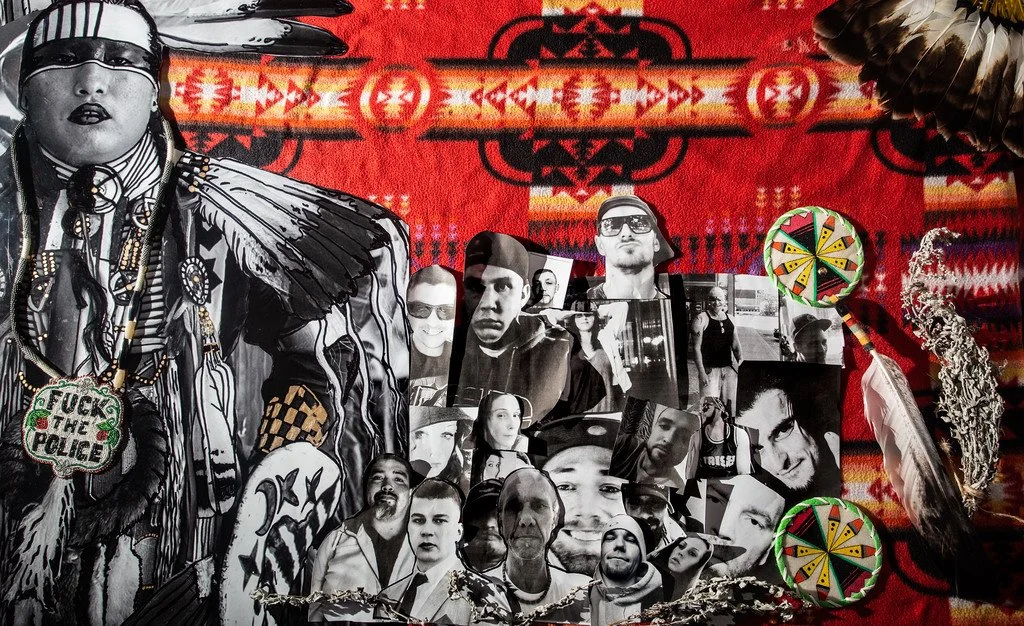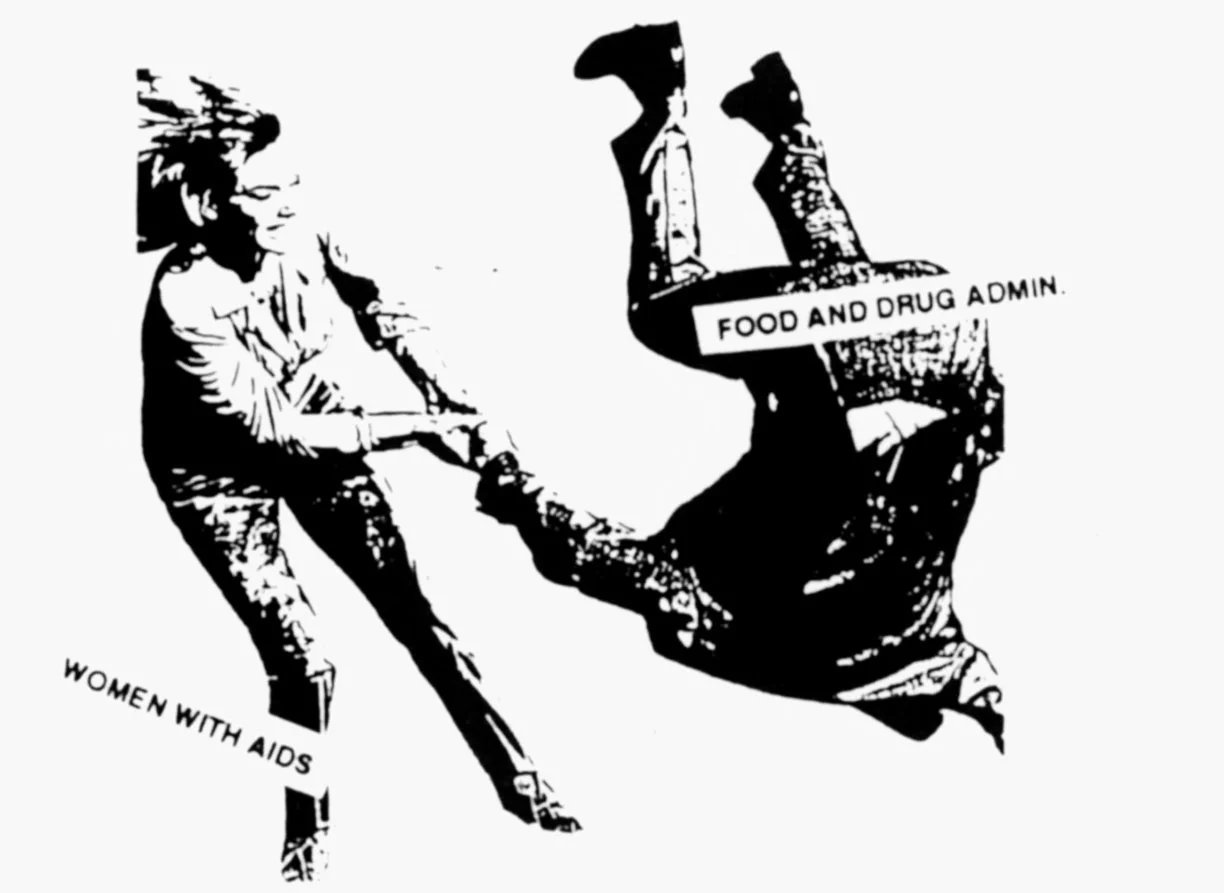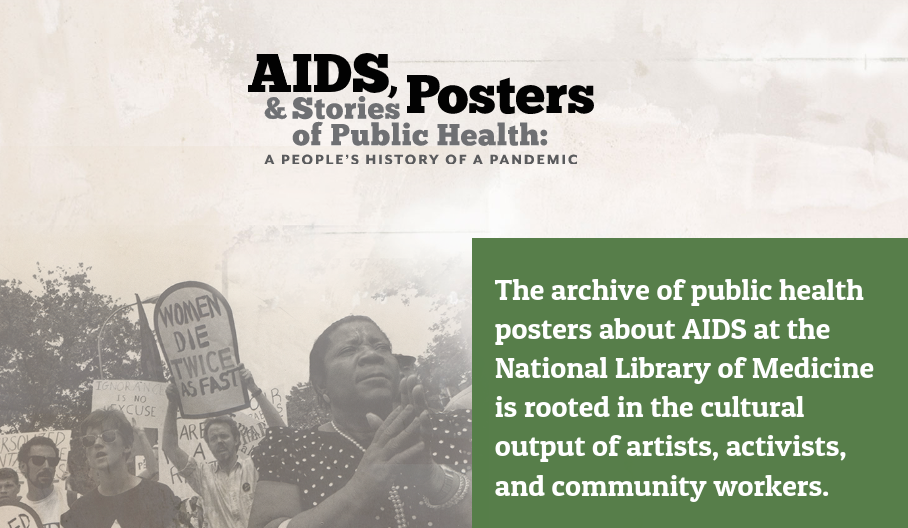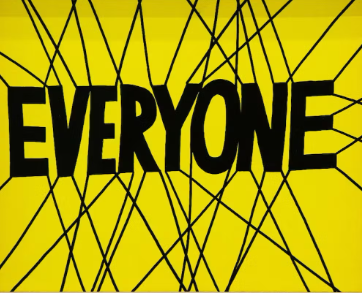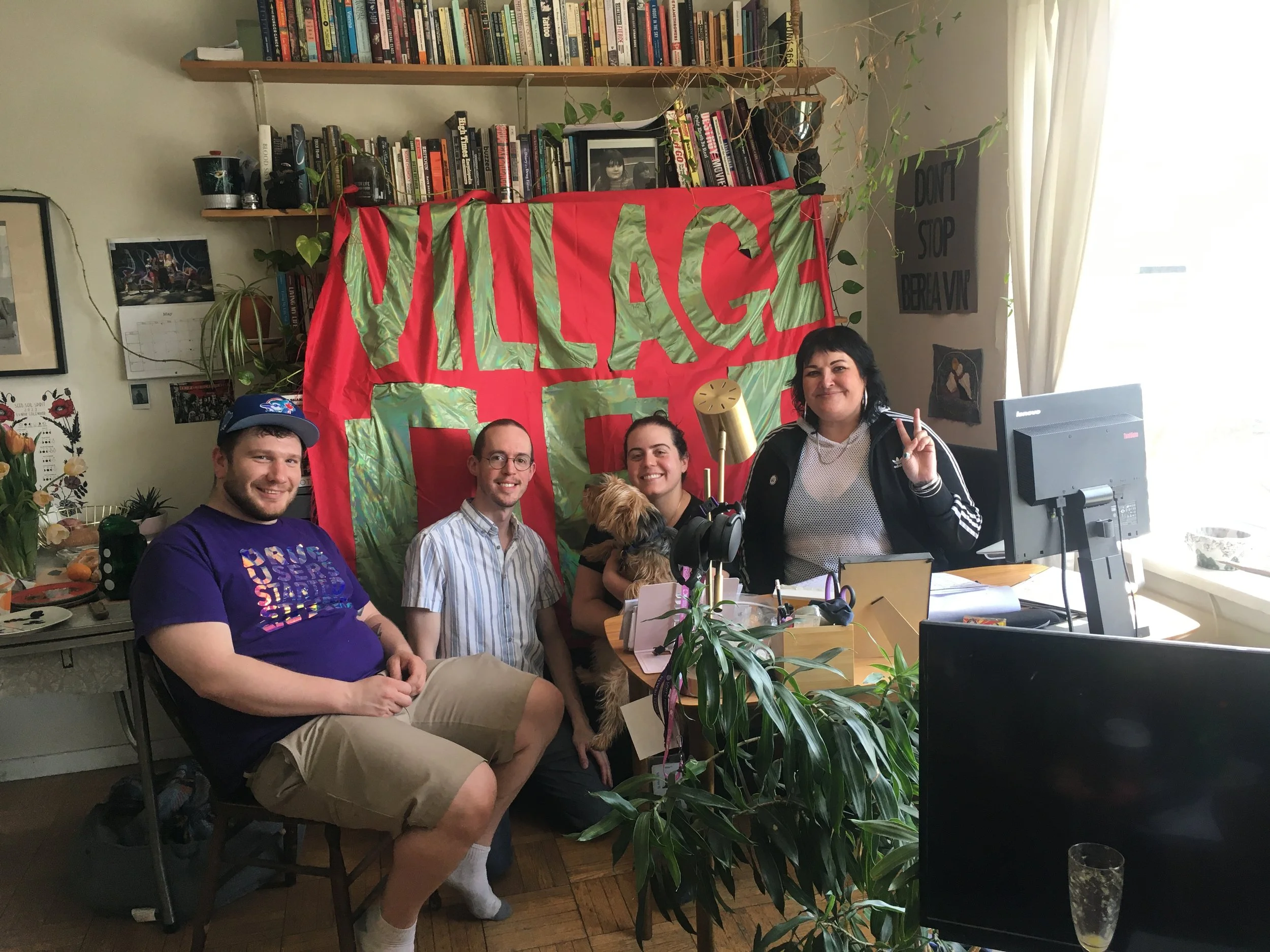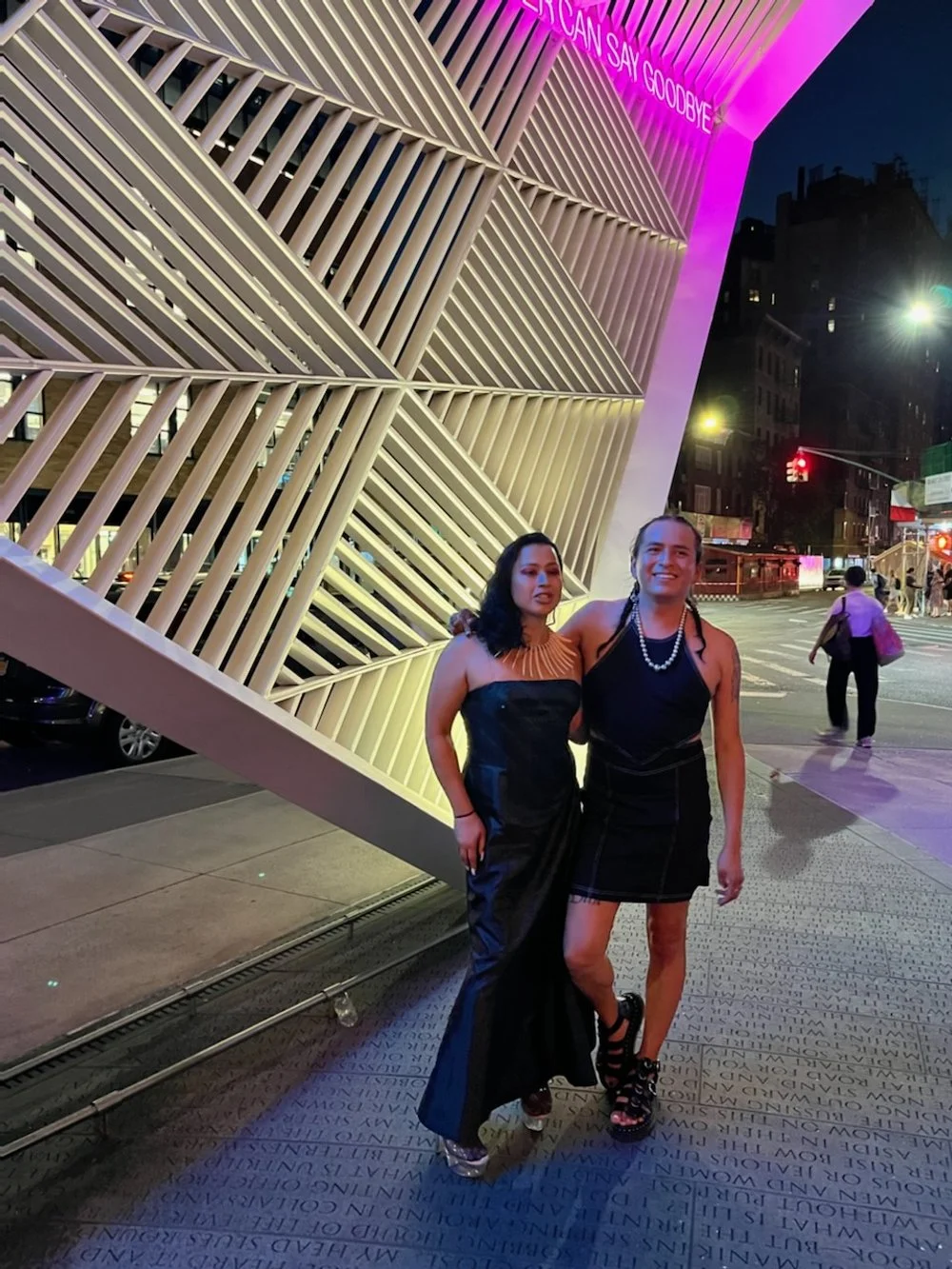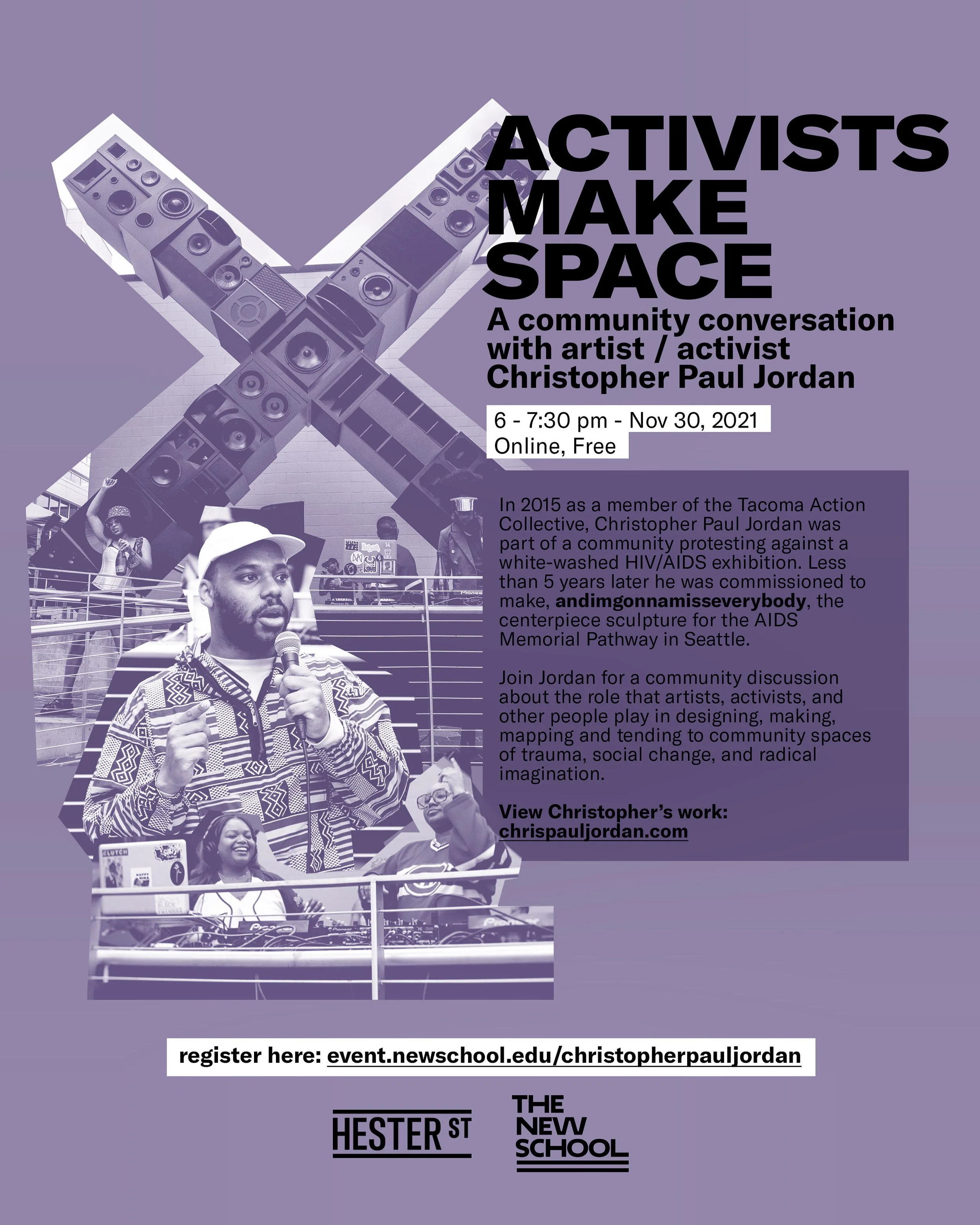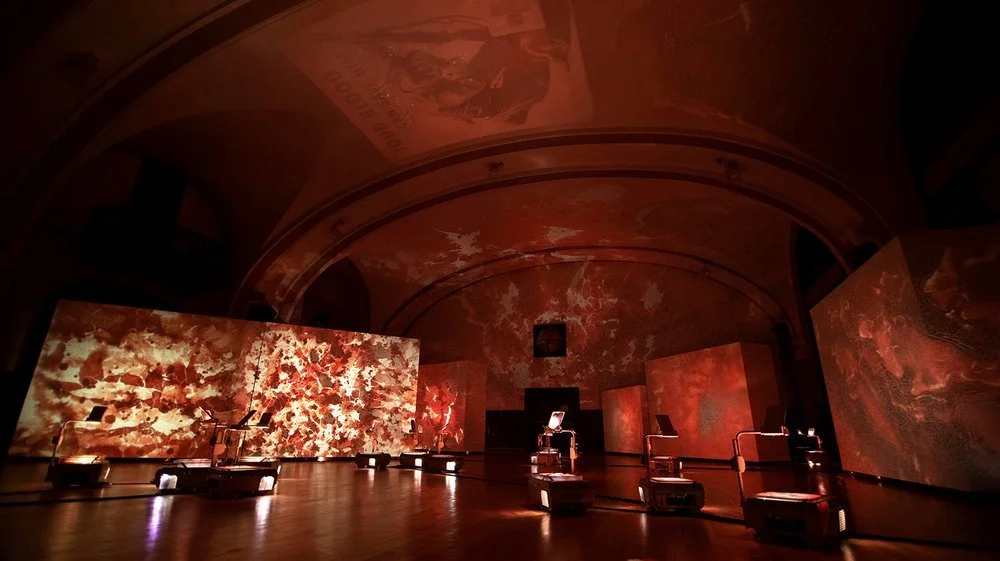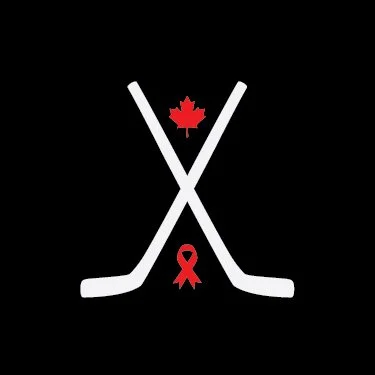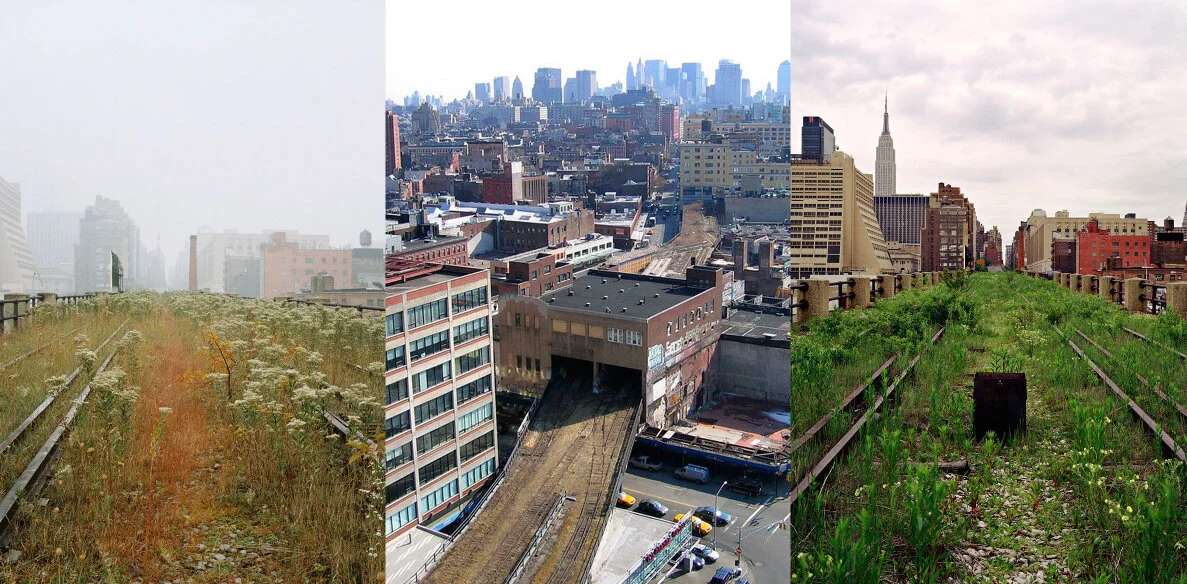WISH YOU WERE HERE, WISH HERE WAS BETTER - a mobile public event series that made space for people impacted by the ongoing overdose crisis—and its cascading systemic issues of precarity, houselessness, and criminalization—to mourn, while providing opportunities to imagine and work towards a more just future.From October 3–9, a van, wrapped in commissioned artwork by Les Harper, popped up daily at various locations across Mississauga and Brampton, starting at the UTM campus. The van served as an anchor for visitors to share reflections, and ask questions about grief, survival, and possibility. The event series culminated with a community feast. The project was organized by community organizer and scholar Zoë Dodd, artist Les Harper, writer Theodore (ted) Kerr, and curator-scholar Ellyn Walker, with contributing artists: Les Harper, Dionne Brand, Cedar-Eve, Abdi Osman and community partners Moyo Health & Community Services, Peel Drug Users Network, Regeneration Brampton. Learn more here.
I, OF COURSE, WAS LIVID - is a piece of documentary theater, co-created by Theodore (Ted) Kerr and Elizabeth Koke, based on a federal hearing transcript documented by activist Nancy MacNeil and archived in The Judy Sisneros / ACT UP LA papers at the ONE Archives featuring the words of Mary Lucey, Wendy Alexis Modesty, and other women battling HIV who demanded the CDC update the then exclusionary definition of AIDS. Each performance of the play features a Voice of the Present, resulting in an ever growing archive of first person narratives of life with HIV across the 20th and 21st century. You can watch performances at The Mark O'Donnell Theater for ISSUE Project Room and The Greene Space for WYNC. Media: New Play Remembers the Women Who Defined AIDS
AIDS, Posters, and Stories of Public Health: A People’s History of a Pandemic for the US National Library of Medicine. This exhibition explores how AIDS posters serve as highly adaptable, durable, cost effective, efficient tools in sharing public health messaging. Created by communities bonded together by illness and a desire to make change, these posters provide a gateway to AIDS history, illustrating how, in the face of illness, neglect, and, early on, the unknown, people came together to connect, create, and save one another's lives. Today, AIDS posters continue to be valuable resources for the ongoing epidemic. They teach us about community organizing processes and the ways that groups dealing with HIV heal, share fears, and strategize toward wellness together. AIDS, Posters, and Stories of Public Health: A People's History of a Pandemic includes selected AIDS posters from Surviving and Thriving: AIDS, Politics, and Culture, the 2013 exhibition about the history of HIV/AIDS in the United States. Learn more about the exhibition and see the digital gallery here.
COMMUNITY KNOWLEDGE PRACTICE, A PORTFOLIO - a portfolio for Visual AIDS that documents three recent examples of community knowledge practice. The portfolio includes, Public Garden, 16 Commerce Street: Anthony Pellino and his 1983 plan for an AIDS Memorial; Pandemic Publications: On AIDS, COVID, and Books by Teo Pfahler; and Don’t Mourn Consecrate: Talking about Juan González’s Historic Public Art. Community knowledge practice is a phrase I use to describe a process of sharing while learning, in which researchers, community members, and other participants come together to listen, present, and consider through presentations and conversation. Community knowledge practice is vital and has been an important part of my AIDS culture work as an organizer, writer, and educator for the past 20 years. It is a strategy I know from traditions such as consciousness raising groups, community-led research projects, activism, the fine art of gossip, some aspects of memorialization, oral history and more. Learn more here.
VILLAGE OPS Archive Project On World AIDS Day 2017, a group of Toronto activists created a pop up Overdose Prevention Site in the heart of the city’s gay village to draw attention to the overdose crisis and the lack of action by local LGBTQ+ and AIDS service organizations. Five years later, I invited participants to remember the action. I recorded a memory circle with four of the activists in person (pictured: Jonathan Valelly, Michael Holmes, Amanda Leo, Zoë Dodd), in Toronto, and others over zoom (Eric Kostiuk Williams, Matthew Strang, Nick Boyce). The project is housed in a google drive that includes all the interviews, plus an appendix file full of contextual information. What the activists found was that the more things change, the more they stay the same. And, as the work continues, there is also something important about seeing what has been learned along the way, including the importance of archiving as you go, reaching out for help across social issues, and learning that maybe your movement heroes won’t save you.
Devouring Empires, a Trans, Non-Binary, and Queer futurist poetic offering and liberatory call to action through the endurance performance poetry.
Indigenous Diné artist Demian DinéYazhi´(they/them) and Trans artist Joss Barton (she/her) organized a multi-stop tour and I helped with the New York event that we held at the New York City AIDS Memorial.
More about their tour: Devouring Empires: Transmitting Sacrit Tongues honors the legacy of Indigenous, Trans, Queer, 2Spirit, Black, and resilient communities of colour. Join us as we peer out over the endless horizon of ancient galaxies reminding us of the sacrit energy callling to create new worlds, languages, and perceptive awakening. Through poetry and creative action we migrate along trade routes of care and love. Through poetry we reckon with our legacies of survival and re-emergence in order to reconnect with cosmological harmony. Through poetry and creative action we come back to our power and strengthen the ties of communal joy.
ACTIVISTS MAKE SPACE: A community conversation with artist / activist Christopher Paul Jordan In 2015 as a member of the Tacoma Action Collective, Christopher Paul Jordan was part of a community protesting against a white-washed HIV/AIDS exhibition. Less than 5 years later he was commissioned to make, andimgonnamisseverybody, the centerpiece sculpture for the AIDS Memorial Pathway in Seattle. At this event Jordan spoke about the role that artists, activists, and other people play in designing, making, mapping and tending to community spaces of trauma, social change, and radical imagination.
OUR BLOOD CAN SAVE - Jordan Eagles
Since 1983 - amid the early days of the AIDS epidemic - gay and bisexual men have been prohibited by the Food and Drug Administration (FDA) from donating blood in the US. Now, during a national blood shortage, due to the COVID-19 crisis, people are calling for that decision to be reversed. From the beginning, scientists and activists have been working to lift the ban, marshaling evidence to show that it does not make sense, puts lives at risk, and creates further stigma for all men who have sex with men and their communities. As part of the ongoing advocacy, artists have been providing inspiration and sharing information, including Jordan Eagles who has been using blood as a medium since the late 1990’s.
For Our Blood Can Save, Eagles builds on the work that has been done to lift the ban, as well as the history of The Major R. Owens Health & Wellness Community Center as a once active armory and the current home for the Brooklyn Community Pride Center.Upon entry, viewers are immersed in Illuminations, patterns and shadows of illuminated blood projected from a series of panels made by Eagles using donated blood from gay, bisexual, and queer men that could have been used to save lives but would be rejected due to the current policy.
Looking up, viewers see a projection of a vintage WWII graphic soliciting blood donation, layered with blood donated by an active U.S. Service Member who identifies as transgender and pansexual. It was during WWII that blood storage was invented by Dr. Charles R. Drew, a Black surgeon and researcher, who would later distance himself from his life saving contribution in protest of the racial segregation of blood, a practice that eventually ended in 1950. As viewers make their way through the exhibition, they are invited to consider how the current blood ban and national blood shortage fit into the longer history of blood in the US, including exclusionary donation and segregation practices that exacerbate suffering during times of war and pandemic. What does it take to change policy? Fear during one pandemic caused the ban. Will it take another pandemic to end it?
See more of the work here.
Related, check out BLOOD, CRISIS, + INNOVATION: A TIMELINE
HOCKEY NIGHT IN CANADA Presented by the Bureau of General Services—Queer Division and What Would an HIV Doula Do? Two Writers… One title. Decades apart, and unbeknownst to each other, writers Berend McKenzie and Francisco Ibanez Carrasco both wrote very beautiful - and very different - short stories about community, connection, and HIV set in Vancouver in the late 20th century, with the same unique title: HOCKEY NIGHT IN CANADA. For the first time, the two writers will come together for World AIDS Day to share their short stories, and talk with each other and an audience about living and creating with community, history, and HIV. Along the way they will also answer the question: What does hockey have to do with HIV anyway? Hockey Night image: Juan Saavedra (knowjuan.com) Watch the event here.
Berend´s story is part of the collection BETWEEN CERTAIN DEATH AND A POSSIBLE FUTURE: Queer Writing on Growing Up with the AIDS Crisis. Francisco´s story appeared in the underground publication, Diseased Pariah News (issue 11).
I WANT - project with students. About this project, David Moore reflects: Inspired by Zoe Leonard’s I Want a Dyke for President, our class [about AIDS at The New School] has collectively composed a piece that embodies community activism in written and spoken word. This student-driven collaboration is a raw and candid call for change and community-based solutions, as opposed to resolutions to social issues seeped in capitalism, authoritarianism, and a self-serving government. This piece memorializes and speaks to, and for, those who live on the periphery of the “American Dream,” and intentionally out of view of the elite. For those who seek equality and long for prosperity. The debut of “I Want a _______” signifies the need to hold our leaders accountable and calls for continued community-based movements that employ the power of activism to ensure everyone has a seat at the table. Read and hear the poem here.
HIV BASICS - project with students.
This downloadable PDF provides 21st century HIV basics that was made with students at The New School living with and impacted by HIV / AIDS. Download here.
WHAT DOES A COVID-19 DOULA DO? At the dawn of the COVID-19 pandemic the What Would HIV Doula Do? collective started creating cultural interventions providing opportunities to share fears, questions, and power. We have crafted a series of questions:TWENTY-SEVEN QUESTIONS FOR WRITERS AND JOURNALISTS TO CONSIDER WHEN WRITING ABOUT COVID-19 AND HIV/AIDS; and three zines: WHAT DOES A COVID-19 DOULA DO? (2020), IN OUR BODIES: A ZINE ABOUT PLEASURE, INTIMACY, AND REALITY IN 2020 (2020), WHAT DOES AN UPRISING DOULA DO? (2021).
HEAR ME: Voices of the Epidemic was an original, open-space, experiential sound-and-light based installation which ran December 1-31, 2020. I co-curated the experience with the New York City AIDS Memorial. The soundtrack was composed of historical texts, poetry, speeches, music, and more that capture the history of the epidemic. Examples include a powerful speech by Vito Russo (1946-90), a song composed by Michael Callen (1955-93), historic recordings of an ACT UP-led protest made by artist David Wojnarowicz (1954-92), and poems by Melvin Dixon (1950-92) and Kia LaBeija, who was born in 1990 at St. Vincent’s Hospital, on whose former site the Memorial sits today. Visitors were welcomed to hear the program, accompanied by a distinctive lighting installation, through December 2020. Hear Me was preceded each day, beginning at 10 a.m., by a recording featuring the names of over 2,000 New Yorkers, representing a fraction of the 100,000+ lost to AIDS, and read by What Would an HIV Doula Do?, a group of activists, caregivers, friends, long-term survivors of HIV/AIDS, and people living with HIV today. You can watch video documentation of the full 45-minute program above or by clicking here.
WHAT YOU DON’T KNOW ABOUT AIDS COULD FILL A MUSEUM: Curatorial ethics and the ongoing epidemic in the 21st Century is issue 42 of the On Curating journal, edited by Theodore (ted) Kerr. The print and online issue features over 40 contributions—including essays, conversations, visual projects, reprints, and personal reflections—from artists, activists, academics, and writers from around the world, exploring AIDS-related culture in the 21st century, through four themes: forgetting, seeing, collecting, and making, all of which reflect on both the historical turn in contemporary AIDS cultural production, and the ongoing need to keep an eye on the present. Artist Projects by Charan Singh, Dudu Quintanilha, Michael McFadden, Nelson Santos, Siân Cook. Conversations between Abdul-Aliy A. Muhammad and Louie Ortiz-Fonseca; Adam Barbu and John Paul Ricco; Carlos Motta and John Arthur Peetz; Emily Bass and Yvette Raphael; Jean Carlomusto, Alexandra Juhasz, and Hugh Ryan; Kairon Lui and Manuel Solano; Kelvin Atmadibrata and Benji de la Piedra; Luiza Kempińska, Hubert Zięba, Szymon Adamczak; and Mavi Veloso and Nicholas D’Avella. Essays by Alper Turan, Avram Finkelstein, Catalina Imizcoz, Edward Belleville, Emily Colucci, Greg Thorpe, Heather Holmes, Jaime Shearn Coan, Jordan Arseneault, Kate Hallstead, Lyndon K, Gill, Manon S. Parry, Marika Cifor, Miiro Michael, Rev. Michael J. Crumpler, Rahne Alexander, Ricky Price, Sheldon Raymore, Stamatina Gregory, Vladimir Čajkovac. Reprints from Cecilia Chung, Olivia Ford, Deon Haywood, Naina Khanna, Suraj Madoori and Charles Stephens; David Kahn and the Brooklyn Historical Society; Demian DinéYazhi´+ R.I.S.E.; People with AIDS advisory committee; l.n. Hafezi and Visual AIDS; Sheldon Raymore; and Triple Canopy with What Would an HIV Doula Do? MORE INFO.
METANOIA: Transformation through AIDS Archives and Activism was a 2019 exhibition at the LGBT Center in NYC, and then again in 2020 at the ONE Archives Gallery in West Hollywood. The exhibitions is an archival examination of community-based responses to the ongoing AIDS crisis in the USA, curated by Katherine Cheairs, Alexandra Juhasz, Theodore Kerr, and Jawanza James Williams for What Would An HIV Doula Do? (WWHIVDD)for The NYC LGBT CENTER and the ONE National Gay & Lesbian Archives at USC Libraries. Th exhibition focused on Katrina Haslip and Joann Walker, and other Black women, and women of color, living with HIV, who are responsible for life shifting activism. MORE INFO.
HOW MANY OF US WILL BE THRIVING FOR STONEWALL 100?, a conversation that paid homage to the 50th anniversary of the Stonewall Riots, a series of uprisings that helped fuel the LGBTQ rights movement. This event was organized by Theodore (ted) Kerr and Diya Vij from The Highline. It was an afternoon of interactive discussion with community members, artists, peers, and trained facilitators from WWHIVDD, with readings by the American Indian Community House, Ngozi Alston from Black Youth Project 100, Sonia Guiñansaca, and Timothy DuWhite. (Photo by Rowa Lee). MORE INFO
LOVE & RESISTANCE: STONEWALL 50 (STATEN ISLAND). As part of the celebration of the 1969 riots, Michelle O’Brien worked with Jason Bauman of the NYPL to create Branch programming. Theodore (ted) Kerr worked with Rosa Haire to create 6 months of related programming at the Stapleton Library on Staten Island. Events included: Riots, Representation, and Results: Stonewall and Staten Island; Storytelling Workshop with writer Jonathan Leiter; screening Lorraine Hansberry: Sighted Eyes/Feeling Heart with scholar Jimmy Wright; and Politics and Poetry: Legacies of Audre Lorde with JP Howard, Gena Mimozo and Jamara Wakefield.
ON TOP OF ALL THIS: Hear poems, fictions, prompts, and predictions from artists Lucas Crawford, Anaïs Duplan, and Emily Johnson as they navigate the past, present, and future of the land on which the High Line now stands. With identity and history in mind, the artists recorded sound-based experiences available to stream below. Listen from wherever you are or enjoy these recordings on a self-guided walk through the park. Produced by Theodore (ted) Kerr and Diya Vij for The High Line. MORE INFO.
Visual Arts and the AIDS Epidemic: An Oral History Project: I was one of 4 interviewers for the Oral History project. I interviewed: Doug Ashford, Julie Ault, AA Bronson, John Dugdale, Sunil Gupta, Frederick Weston, , Robert Vazquez-Pacheco, Kenny Scharf, Sur Rodney (sur), Eric Rhein, Hunter Reynolds, Frank Holliday and Alexandra Juhasz. You can access the interviews HERE.
The HIV Howler: Transmitting Art and Activism, a limited edition art newspaper focusing on global grassroots HIV art and cultural production. It debuted at the International AIDS Conference in 2018. Publishers + Editors: Anthea Black and Jessica Whitbread; Editorial Advisory Committee: Anthea Black, Theodore Kerr, Charles Long, Mikiki, Darien Taylor, L’Orangelis Thomas, and Jessica Whitbread.Funding: The HIV Howler gratefully acknowledge the support of the Toronto Arts Council.
NEW YORK CITY TRANS ORAL HISTORY PROJECT: a community archive devoted to the collection, preservation and sharing of trans histories, organized in collaboration with the New York Public Library.I have done a few interviews, and help a bit with planning.(image: roanboucher.com) MORE INFO
“Forgetting ACT UP”: In her essay “Forgetting ACT UP”(Quarterly Journal of Speech, 2012), filmmaker, activist and academic Alexandra Juhasz explores the idea that, “When ACT UP is remembered—again and again and again—other places, people, and forms of AIDS activism are disremembered.” At this 2015 event at the Bureau for General Service: Queer Division, I facilitated a discussion in which attendees explored Juhasz’s essay, as well as discussed what her argument meant at the moment when some responses to early AIDS activism are being remembered, while much of what has happened has yet to be remembered, reclaimed, and acknowledged. How does this lack of remembering fit into discussion and action around #blacklivesmatter and how does it impact work being done presently around HIV/AIDS?
TIME IN NOT A LINE: In 2015 I invited a group of folks interested in exploring what is needed within the ongoing HIV/AIDS movement for a day long discussion building on the 2014 WE WHO FEEL DIFFERENTLY journal issue I edited. One of the three sessions we had was entitled: WHAT WOULD AN HIV DOULA DO? Building on the growing role doulas are playing in birth, death, abortion, gender transition, and other important life moments , the gathered group wondered if there wasn't a role for doulas to play in the lives of people living with HIV and those made most at risk? The discussion lead to the creation of the WHAT WOULD AN HIV DOULA DO? collective. The day of discussionswas supported by the Department of Art & Public Policy, Tisch School of the Arts, New York University. HERE FOR A TRANSCRIPT AND IMAGES OF THE DISCUSSION
CULTURE PUSH FELLOW 2017 Culture Push launched the Fellowship for Utopian Practice in 2012 to support boundary-pushing, interdisciplinary and socially engaged artwork. The Fellowship is a process-based program aimed at artists and other creative people who are seeking to test new ideas through civic engagement. Culture Push offers the Fellows concrete financial and institutional support, including feedback and mentoring, a stipend, and fiscal sponsorship for fundraising efforts, and heightened legibility, through support from the Culture Push institution. During the Fellowship year, Fellows collaborate with different communities and the Culture Push staff to find viable working methods for realizing ambitious hybrid projects. While Culture Push emphasizes the visual and performing arts, the Fellowship program is open to people working in any discipline aiming to expand their practice beyond its traditional borders.
A TIME TO LISTEN is a conversation series where we learn from the past and come together to prepare for the future. Part of a new project at the New York City AIDS Memorial called Hear Me: Voices of the Epidemic which launched December 2020. The 6 episodes feature: Ann Northrop, Kenyon Farrow, Dave Harper, Jason Walker, Kiara St. James, Krishna Stone, DJ Danny Krivit, Stephen Hicks, Cecilia Gentili, Cheri, Professor Jennifer Brier, Donja R. Love, Sheldon Raymore, Alysia Abbott, Timothy DuWhite, and Mathew Rodriguez. You can watch all 6 episodes of A TIME TO LISTEN at atimetolisten.org.
TWENTY-ONE QUESTIONS TO CONSIDER WHEN EMBARKING ON AIDS RELATED CULTURAL PRODUCTION. To think through the current landscape of HIV/AIDS-related culture, Corrine Fitzpatrick (Triple Canopy) and Theodore Kerr,( What Would an HIV Doula Do?), hosted a 2018 conversation entitled What Would an HIV-Informed Cultural Worker Do? This document is what came from that conversation. Informants include:Jordan Arseneault, Shirlene Cooper, Emily Colucci, Lisa Diedrich, Alex Fialho, Johnny Guaylupo, Emma Hedditch, Elizabeth Koke, Carolyn Lazard, Esther McGowan, Fernando Mariscal, Lara Mimosa Montes, Ricardo Montez, Julie Tolentino, and others who chose not to be named.
WHAT WOULD AN HIV DOULA DO?: A collective of folks joined in response to the ongoing AIDS Crisis who understand a doula is someone in community who holds space for others during times of transition. For us, HIV is a series of transitions in someone's life that does not start with with being tested nor end with getting on treatment or death. Foundational to our process is asking questions. Proud to be a founding member. MORE INFO
THE PAST PREPARES US FOR A BETTER FUTURE - ORGANIZED BY TIMOTHY DuWHITE for WWHIVDD Writer and poet Timothy DuWhite hosted a workshop / reading series which brought together personal writing, contemporary conversations around HIV/AIDS, and research. At the core of the workshop was a question around how conversations from the past can help create new discussions in the present and prepare for a better future Each week DuWhite was joined by a guest writer (Steven G. Fullwood, Linda Villarosa, Michael Roberson,Kenyon Farrow, Pamela Sneed)whose practice is rooted in the ongoing response to HIV/AIDS.
Study Sessions at The Whitney Museum Study Sessions is an ongoing event series inspired by Fred Moten and Stefano Harney’s notion of study as “what you do with other people.” For each Study Session, an artist, writer, or cultural worker selects a work of art on view in the Whitney’s permanent collection galleries as a departure point for thinking through an urgent question in our contemporary political landscape. Participants are invited to join together in open-ended discussions, and engage with creative practice. Study Sessions may take the form of workshops, listening parties, performances, readings, or film screenings. The May 4th session was led by Samantha Box, Ted Kerr, and Traci C. West. They used Gran Fury’s Women Don’t Get AIDS, They Just Die from It poster as a jumping off point to engage participants in questions around art, HIV/AIDS, protest, and how images can move viewers from observation to active engagement.
HIV WITH: was a five-part writing workshop series I organized in the spring of 2017 for WHAT WOULD AN HIV DOULA DO? with the support of POETS & WRITERS that brought together writers, care givers, and others living with HIV and impacted by the epidemic to share their experiences and skills. The workshops were free and open to the public. Some experience with HIV and a desire to write was all you need to participate. Workshops included: WRITING WITH TRAUMA with Jennifer Patterson + Michael Crumpler at Judson Church; BEYOND PUBLIC HEALTH with Joseph Osmundson + Lodz Joseph at HousingWorks; THE SPIRIT AND THE STATE with iele paloumpis + Timothy DuWhite at The New School; El VIH Y Yo with Miguel Caballero + Tamara Oyola Santiago + Diana Cage at BOOM Health; WITNESS with Cat Fitzpatrick and Christopher Jones at Union Theological Seminary. (question posed by Timothy DuWhite) MORE INFO
MIKE ALBO and BRONTEZ PURNELL: JOHNNY WOULD YOU LOVE ME IF MY DICK WAS A HORNITO?: In the fall of 2015 I worked with the Bureau of General Services Queer Division and Lambda Literary to host a conversation between writers and heartthrobs Brontez Purnell and Mike Albo. Brontez read from his recently released book at the time, Johnny Would you Love Me If My Dick Were Bigger. Albo read from his then soon to be released Kindle Single, Spermhood, which would go on to become a one man show. William Johnson from Lambda and I moderated conversation with the authors after their reading. READ PART OF THAT DISCUSSION.
TIME IS NOT A LINE: CONVERSATIONS, ESSAYS and IMAGES ABOUT HIV/AIDS NOW: Issue 3, Fall 2014 edition of Carlos Motta's We Who Feel Differently Journal, which I edited. Featuring: Xaviera Simmons, Pato Hebert, Cyd Nova, Aimar Arriola, Kenyon Farrow, Nathan Lee, Carlos Motta and Bryn Kelly. MORE INFO
FOUNDATIONAL SHARING: Visioned by Aldrin Valdez, Foundational Sharing was / is a publication and performing platform for and by community. Aldrin and I did / do share text with each other that inspires us. We then pass(ed) it on to artists we love to contextualize in relationship with their own practice. Then, in a cozy location, we invite friends and other love ones to hear the artists share, and we present the texts in zine form. MORE INFO
BREAKING INTO HISTORY: AIDS, the ARCHIVE and the FIGHT AGAINST the CANONIZATION of an ONGOING EPIDEMIC: .For the April 2016 conference Queer Circuits in Archival Times, I put together a panel to explore how in recent years video, visual art, storytelling, printed material, literature, medical records, performance, gossip, online registries and other queer sources of sharing have been used to tell early stories of HIV/AIDS in the US and how even still there is still too narrow of a story being told about HIV. This canonization stemming from the archive and networked ways of knowing limit not only how we understand the past, but how we act in the present and imagine the future. On the panel were filmmaker Tiona McClodden; media maker and theorist Julian DeMayo and academic Ian Bradely-Perrin. MORE INFO.
For the NURTUREart’s 2018 residency for new collaborations Theodore (Ted) Kerr and family nurse practitioner, acupuncturist, and professor Ronica Mukerjee DNP, FNP, MsA, LAc brought their respective skills and experiences together in an effort to better understand the role of the doula when it comes to HIV and related care. Central to their conversations was that HIV is best understood in relationship to: race, gender, sexuality, class, geography, history; as well as other health realities such as poverty, stress, and, incarceration. Through conversations, visualization projects and community events, Kerr and Mukerjee explored the role a doula can play in helping us all more fully consider ideas around health.
WISH YOU WERE: LETTERS TO ROBERT RAYFORD, MICHAEL BROWN, MICHAEL JOHNSON: Hosted at the legendary MoKaBe's Coffeehouse in the summer of 2015 this event organized by me, Joss Barton, and Maurice Tracy, was an opportunity to make connections between various forms of state violence and to reflect on what the loss of life and freedom means for individuals and the community as a whole. WISH YOU WERE HERE was both a sentiment directed at Rayford, Brown, and Johnson, and for justice. (photo by Jun Bae). MORE INFO
HAVE YOU BEEN VULNERABLE TODAY? Seasoned activists Rusti Miller-Hill, Dethress Ulmer-Lesley and Fortunata Kasege offered powerful views of the ongoing HIV crisis. The welcoming and participatory gathering found the women leading a discussion around intimate partner violence, incarceration re-entry, trauma, parenthood, faith and disclosure. Active in this conversation were ideas around unity, community and disclosure. Have you been vulnerable today? How have you been made vulnerable? How do you act in solidarity? What is at stake for you? What does love in action look like for you? I organized the event with members of the Positive Women's Network including Miller-Hill, Ulmer-Lesley and Olivia Ford, April 2015.
MOBILIZING NEW YORK: AIDS, Antipoverity and Feminist Activism A Conversation between Tamar Carroll and Kenyon Farrow: A reading and discussion event I organized in 2015 at Bluestockings that brought together two powerful voices. Each read recent work related to social justice and HIV/AIDS, followed by an enlightening conversation. Transcript is forthcoming.
DEVIANT PLAYS: A public discussion about sex, art, community and taking health and representation into one's own hands that Started with performances and presentations from Kia Labejia, Timothy DuWhite, and Chaplin Christopher Jones. As the night progressed the event became an open forum for people under-served, not served, and/or not relying on traditional means of health promotion, AIDS awareness, and other life enhancing information and education. Created and facilitated by me and Zachary Frater for Visual AIDS, May 2014. MORE INFO
(RE)PRESENTING AIDS: CULTURE and ACCOUNTABILITY: Inspired by Hugh Ryan's NY TIMES op-ed, How to Whitewash a Plague, for Visual AIDS I worked with the Pop-Up Museum of Queer History and CLAGS to present a public forum in August 2014 which explored the role museums, galleries and cultural institutions play, and can play, when presenting exhibitions related to HIV/AIDS. This forum included voices involved in the curation, marketing and administration of AIDS related exhibitions, as well as artists, critics, and others with an invested interest. The evening was an interactive discussion with an opportunity to consider the needs and wants related to an exhibition about HIV/AIDS. It was moderator by Ann Northrop. Speakers were: Jason Baumann, Collections Strategy/LGBT Collections, New York Public Library; Kia Benbow, Artist, grenAIDS; Jim Hubbard, Filmmaker, United in Anger; Karl McCool, Assistant Director, Dirty Looks; Kris Nuzzi, Curator, Not Over; Hunter O'Hanian, Museum Director, Leslie Lohman Museum of Gay and Lesbian Art; Edwin Ramoran, Manager of Public Programs and Community Engagement, The Studio Museum in Harlem; Hugh Ryan, Writer, Founding Director of the Pop-Up Museum of Queer History; Amy Sadao, The Daniel W. Dietrich, II Director, Institute of Contemporary Art at the University of Pennsylvania; and Nelson Santos, Executive Director, Visual AIDS. TRANSCRIPTS AND MORE INFO.
LIFE CHANCES: HIV CRIMINALIZATION + TRANS POLITICS: Life Chances, examined discriminatory laws and regulations such as "stop and frisk" and "condoms as evidence", disclosure, and other rules, systems and norms that reduce life chances for trans people and/or people who are living with HIV. In this conversation, Che Gossett, Dean Spade, Mitchyll Mora and Sean Strub discussed issues related to trans politics and HIV criminalization, activism, resistance and social justice. The conversation was hosted by Laverne Cox. The event was organized by myself, Cassidy Gardner from QUEEROCRACY, with help from Reina Gossett and people at the Sylvia Rivera Law Project and the Sex Worker Outreach Project New York . The poster was created by Kenny O, Julie Blair and Tom Léger. (Transcription forthcoming) MORE INFO ON THE POSTER.
WHAT YOU DON'T KNOW COULD FILL A MUSEUM: AIDS, Art, and the Institution. Wanting to continue the conversation started in August 2014, while working at Visual AIDS I organized a follow up discussion for the Brooklyn Museum, featuring academic Tara Burk; filmmaker Jean Carlomusto; photographer Vincent Cianni; and writer Hugh Ryan. The event was moderated by activist and artist Brittany Duck. TRANSCRIPT, IMAGES, MORE INFO.
THE PERSONAL and the POLITICAL: LOSING PARENTS TO AIDS: Inspired by her own life and work of Sarah Schulman, writer Alysia Abbott approached Visual AIDS about creating an event around the children who have lost a parent to HIV/AIDS. The event was held in the winter of 2013 and featured Abbott, as well as Kia Labeija and Mathew Rodriguez The event was moderated by Schulman. Together the panelists and the room wrestled with the questions: What are the experiences of people whose parents died of AIDS? How do they understand these experiences? What do they need? Did their parents die of AIDS, or of government indifference and neglect? How can such a significant experience be brought to light in its range and scope and integrated into our understanding of the AIDS community?Abbott would then go on to work with Whitney Joiner to create The Recollectors. HERE TO WATCH THE PANEL.
YOUR NOSTALGIA IS KILLING ME AT THE NYPL: In March 2014, while working at Visual AIDS, we partnered with the New York Public Librarya conversation and public forum around the issues of nostalgia, art, AIDS and representation with artists, writers, activists, and other members of the public. The event began with a discussion between "Your Nostalgia Is Killing Me" poster creators Vincent Chevalier and Ian Bradley-Perrin, along with artist Avram Finkelstein, and writer John Weir. The event was moderated by Patrick "Pato" Hebert based on a format designed by himself and organizer/activist Tamara Oyola Santiago in discussion with Visual AIDS. The panel discussion was followed by small group break out sessions (facilitated by Oyola Santiago, Brittany Duck, Ella Boureau, and Ted Kerr) and then expanded into a large group discussion. Both the panel and large group discussion were recorded, which you can watch on YouTube. MORE INFO and RELATED WRITING.
IN CONVERSATION: DAVID FRANCE and JIM HUBBARD: In March 2013, Visual AIDS and The New School brought together directors David France (How to Survive a Plague) and Jim Hubbard (United in Anger) to discuss their films as part of a three part series we organized entitled Revisiting the AIDS Crisis and the Ongoing Epidemic: Health Challenges in the 21st Century. Photo credit: Sam Feder. WATCH THE CONVERSATION. MORE INFO
TIME IS NOT A LINE: A PUBLIC CONVERSATION AROUND THE ANXIETY OF KNOWING, FORGETTING, HISTORY and LIVING: Pato Hebert, Tamara Oyola Santiago and I conceived of this event as a place where people could: process the conversation that happened the day before between David France and Jim Hubbard; talk about the ongoing impact of HIV/AIDS; and be in community with others who are trying to navigate the past, present and future. The event included small groups facilitated by students of Ricardo Montez and presentations from Julian DeMayo, Silas Howard and Tom Léger. READ MORE.
Dirty Looks On Location: I curated 4 screenings the summer of 2015 for the biannual film and video event including: Breeden with Vincent Chevalier in which we hosted multiple screenings of his film in a hotel room; History Doesn't Have to Repeat Itself with the filmmaker Stéphane Gérard at the Bronx Academy of Art and Dance; She's A Talker, a seldom seen short film by Neil Goldberg; and WAVE and Womanism at Union Theological Seminary in which We Care by WAVE and Villanelle from Hyatt Hayat were screened. MORE INFO
The Practice of Everyday Freedom: Richard Hudler and Rupert Raj: Through artistic interpretations of archival material from the Canadian Lesbian and Gay Archives and the Pride Library from the University of Western Ontario, The Practice of Everyday Freedom was an exhibition and programming platform which celebrated and explored key contributions, moments, and accomplishments in the lives of Richard Hudler and Rupert Raj. The Canadian Lesbian and Gay Archives were proud to welcome Richard Hudler and Rupert Raj into the National Portrait Collection, both trailblazers who have improved the life chances for LGBTQ+ Canadians. The exhibition featured newly commissioned portraits of the inductees by Maya Suess and Matthew Tarini. Curated by me and Aidan Cowling Spring 2013. MORE INFO
The Purpose of Being Loud, 2009, screening Trevor Anderson's insta-classic, The Island, with Derek Jarmen's iconic BLUE. At the heart of both is isolation, HIV stigma, and desire to see and be seen.
QUEER IMAGES, 2010, Metro Cinema, Under the wonderful eyes of Marsh Murphy I had the opportunity to curate a few nights at Metro Cinema, including this screening: QUEER IMAGES


